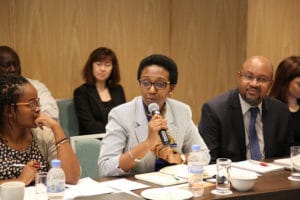
The Rwanda Cooling Initiative, initiated in Kigali at the outset of the Africa Cooling Efficiency Conference, includes five action areas, most notably an energy efficiency market assessment, development of a national cooling strategy and energy performance standards, and training of government officials to adopt and implement the recommended policies.
“As governments, we have a responsibility to put in place regulations that promote energy-efficient equipment, both at home and for industry. We also know that the best time to invest in improved energy efficiency is when one is making the decision of which equipment to buy. That’s why we need to move quickly to set the standard, and explain the benefits to consumers in a language they understand,” said Rwanda’s Minister of Environment Vincent Biruta at the Africa Cooling Efficiency Conference.
Cooling equipment stock in Rwanda is expected to increase stridently.
According to United for Efficiency estimations, the refrigerator stock is expected to increase from 100,000 units in 2015 to 1 million units, and room air conditioner stock from 12,000 to 180,000 units, by 2030.
This is increasing electricity demand and boosting greenhouse gas emissions.
As the country’s electricity grid currently serves only 27 per cent of the population, efforts from many sectors are required to drive the country in a pathway that allows to improve the well-being and energy access of the population whilst it uptakes the rampant growth.
The Rwanda Cooling Initiative brings Rwanda significant savings. It will allow Rwandan customers to save $40M in energy bills, and the country to save 164 gigawatts of electricity and to increase electricity energy availability on the grid to connect around 70,000 homes.
With the nation’s capital as the namesake of the Kigali Amendment to the Montreal Protocol on the phase down of the production and usage of hydrofluorocarbons (HFCs), it is fitting that Rwanda is interested in pursuing exemplary action.